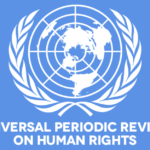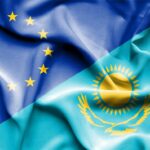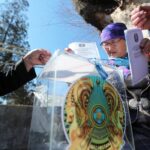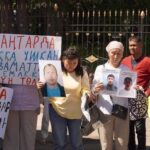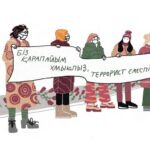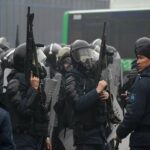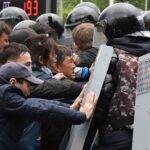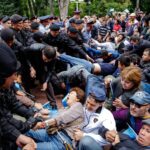KAZAKHSTAN
Submission to the UN Universal Periodic Review
20TH Session of the UPR Working Group
Submitted 15 MARCH 2014
Joint Submission by:
Kazakhstan NGOS Coalition against Torture – coalition of 29 NGOs united to combat torture through monitoring, litigation, legal reform and advocacy
Address: suits 423, 428, bld.4A, Micro district 8, 050035, Almaty, www.bureau.kz
Legal Policy Research Centre – independent legal policy think tank specializing in research, analysis and advocacy to promote human rights standards
Address: 157 Abaya Ave., office 44, Almaty, 050009, Kazakhstan,tell/fax: +7 727 394 36 60, 394 36 94, info@lprc.kz, www.lprc.kz
Public Foundation “Charter for Human Rights”
Mission is to assist in promotion of legal and political reforms in the Republic of Kazakhstan.
Address: Office 46, 155, Abai Ave., Almaty, 050009, Republic of Kazakhstan; anna@chr.kz, zhemis@chr.kz
RULE OF LAW
I. The Right to life
II. Right to liberty
III. Independence of the judiciary and the guarantees of a fair trial
IV. Torture And Ill-Treatment
Right to life
Zhanaozen
On December 16, 2011 the police opened fire on protesters during the riots in the city of Zhanaozen, in Mangystau region of Kazakhstan. As a result of the use of firearms by law enforcement agencies, 16 people were killed and about a hundred injured, according to the official figures. Public authorities accused striking workers for fueling the civil disorder. During seven months preceding the conflict, the oil workers were on strike to demand improvement of working conditions and wage increase. The government failed to take adequate measures to resolve the labor dispute. Intimidation and pressure by the authorities against striking workers and their leaders led to escalation of the labor conflict.
Kazakhstan, despite calls from the international community, including the UN High Commissioner for Human Rights Navanethem Pillay, has not conducted an open and thorough investigation into the events of 16 December in Zhanaozen. The senior officials, who authorized the use of firearms against the population, remain unknown.
The formal criminal investigation was directed primarily against the leaders of oil workers, as well as human rights activists and public figures. Representatives of the International Monitoring Mission of the European human rights organizations came to the following conclusions on the basis of trial observations of 37 workers: [1]
i) 27 out of 37 defendants and 10 witnesses claimed during the trial that there were subjected to torture and cruel and degrading treatment during preliminary investigation. Their right to lawyer had also been denied at pre-trial stage;
ii) Kazakh authorities have not carried out any effective investigation of defendants’ and witnesses’ allegations of torture, despite the fact that they pointed to specific law enforcement officials by name. As a consequence, none of the perpetrators of torture were punished. Moreover, the Court made use of the tainted evidence, claiming that the allegations of torture were used as a pretext by defendants to avoid criminal liability.
iii) Most of the evidence used in the court raised concerns about its validity and accuracy. In addition to the use of evidence obtained by torture, the court admitted questionable testimonies by police officers, who participated in clashes with protesters, including their claims that they identified defendants from considerable distance in the crowd, as well as witness testimonies of small business owners, who claimed they had been interrogated under duress. The trial in general was conducted with strong prosecution bias and the lack of presumption of innocence.
iv) Another violation of fair trial standards related to the repeated use of evidence by anonymous witness. Thus, the verdict against 21 defendants was mainly based on the evidence by anonymous witness.
Death penalty
Kazakhstan did not implement UPR recommendations of the first cycle concerning the issue of death penalty or took any measures in that direction. In particular, Kazakhstan has no plans in the near future to abolish the death penalty, and to take steps to sign and ratify the Rome Statute of the International Criminal Court, as well as the Second Optional Protocol to the International Covenant on Civil and Political Rights. The government has also failed to introduce moratorium on the imposition of the death penalty. In practice, there remains only moratorium on execution of the death penalty. Contrary to the recommendations of the UPR in the current Criminal Code of RK and the new draft Criminal Code there is an extended range of offenses which are punishable by death penalty.
Recommendations:
– Conduct a thorough and impartial investigation into the events of the 16th of December 2011 in Zhanaozen. Provide adequate punishment for all responsible for the use of firearms against the population.
– Conduct a thorough and impartial investigation into the allegations of ill-treatment and torture of the defendants in the trial of 37 oil workers and others, and to bring the perpetrators to justice.
Eliminate the possibility of the death penalty from the Constitution of the Republic of Kazakhstan. Remove the death penalty as a form of punishment from the criminal legislation of the Republic of Kazakhstan; Ratify the Second Optional Protocol to the International Covenant on Civil and Political Rights.
II. Right to liberty
In Kazakhstan, arrested persons are usually registered, not from the moment of actual apprehension, but from the moment of signing the protocol of administrative or criminal arrest. As a result, detainees tend to spend more than 72 hours, established in the law, before appearing in court.
There have been cases of detaining persons in places, which are not recognized as official places of detention, such as law enforcement offices, police cars, private houses, etc., where detainees are held «incommunicado».
During the first hours of detention, the arrested persons do not have their procedural rights explained to them, including the right to a legal aid lawyer. As a rule, the largest number of violations of procedural rights of suspects and defendants occur at this stage, when persons are in police custody without access to a lawyer and without being fully informed of their rights.
The existing procedure for judicial authorization of arrest is not fully consistent with the standards of «habeas corpus» and does not guarantee the protection of persons against torture and illegal detention. Legality and validity of the arrest is not subject to the judicial review. The suspect/or defendant in the pre-trial detention hearing is not examined by the court on possible violations of his rights and freedoms during arrest or police custody. Powers of the court are limited to the examination of information necessary to establish the case for pre-trial detention (in the check list manner), such as: gravity of the incriminated crime, place of permanent residence, ID, information on prior violations of detention measures, and attempts to flee justice. The court that sanctions pre-trial detention is a first-instance court, which later may hear the same case on the merits. More than 95% of police requests for pre-trial detention are sanctioned by the court.[2]
At present, the government is in process of adopting the new Criminal Code and the Criminal Procedure Code with entry into force tentatively planned for 2015. The new Draft Criminal Procedure Code is even more contradictory to international standards on the right to liberty. Thus, there is a provision which prescribes pre-trial detention of suspects based solely on the gravity of criminal charges, such as homicide, act of terrorism, recruitment for illegal activities, assassination attempt against the first president, etc., all together listing 12 crimes. This is in clear violation of the presumption of innocence requirements by the ICCPR. The new law also allows for the arrest of persons suspected of criminal misdemeanors.
Recommendations:
– Ensure that the rights of arrested persons are guaranteed from the moment of actual apprehension, including compulsory and immediate notification of all procedural rights;
Provide to all arrested persons immediate access to a lawyer, including legal aid lawyer, guaranteed by the state;
– Ensure that judicial control over the legality and grounds for arrest, including observance of the rights of arrested persons, takes place within 48 hours of arrest;
– Ensure that procedure for judicial sanctioning of pre-trial detention is in accordance with international standards, including prohibition of pre-trial detention solely on the basis of gravity of criminal charges.
III. Independence of the judiciary and fair trial
Legislation and practice in Kazakhstan fail to comply with international standards on independence of the judiciary and fair trial. Recommendations of the UN Human Rights Council numbered 53, 54, 57, 58, 59, 60, 61, and 62, indicated in Working Group Report on the UPR for Kazakhstan are not fully implemented. The following problems with the judiciary remain topical:
Appointment of judges
Formation of courts and the judiciary is under the direct control of the President. [3] Judges of the Supreme Court are formally approved by the Senate, while the nominations submitted by the President, based on the recommendations of the Supreme Judicial Council, which is also formed by the President. [4]
Accountability of Judges
Grounds for disciplinary liability of judges, such as violation of legality in adjudication of cases, committing disreputable act contrary to judicial ethics, gross violation of work discipline, etc., are not clearly defined in the law and allow punishment of judges for minor infractions and controversial interpretation of the law.[5] The body that imposes disciplinary sanctions is the Court Jury, which is not independent because it is established only by appointment of the Chairman of the Supreme Court.[6] The procedure for dealing with disciplinary cases against judges is not adversary and does not provide for the judicial review of the disciplinary sanction.[7]
Lack of de facto financial independence of judges
Dismissal of judges may be the result of reducing the public budget allocated for the maintenance of the judiciary. For instance, in November 2010 as part of the optimization of government agencies, financed by the state budget, 70 judges were dismissed in violation of the Constitution.[8]
The role of the Chairmen of the Court
The legal provisions on the Chairmen of the Courts give them broad mandate on career development and organizational issues. In practice it leads to their influence on important aspects of the judicial status, such as: judicial careers, disciplinary liability, removal of judicial powers and other. [9] Such practice results in vertical subordination of individual judges to the Chairmen of the Courts and to lower courts being subordinate to upper courts.
Lack of independence of the judiciary system leads to denial of impartiality and fairness in conducting trials. In addition to systemic issues, criminal procedure law also contains provisions that are contrary to the principles of adversarial proceedings. The following are the main problems with the right to fair trial:
The dominant role of prosecutors in the administration of justice
Prosecutors are vested with broad powers in the justice process, such as: authorizing actions to limit the constitutional rights (search, seizure, inspection of correspondence and many others), the right to request the case file from the court, to protest against the judicial decision including the ones entered into force, rule on the issue of removing defense counsel from the case during pretrial proceedings, etc.
Lack of equality of parties in presenting evidence
Factual information may be used as evidence only after it has been properly recorded in the investigation protocols. At the preliminary stage of investigation, the police officers and investigators are in charge of keeping the record of protocols and the case file. The defense may include materials as evidence to the case file at the pretrial stage only after satisfaction of such petitions by an investigator or police officer. Also, only investigators approve the order for conducting various forensic expertise upon submission of appropriate motions by parties to the criminal proceedings. Such approval procedures do not allow the defense to carry out thorough and timely recording of evidence.[10]
Prosecution bias
Judges rarely acquit criminal defendants. In about 99% the indictments of prosecutors are supported by judges. The conviction is ensured, despite the flagrant violations of the criminal procedure, international standards and even common sense on the part of the judges.
Recommendations:
– Ensure that the members of the Supreme Judicial Council are appointed by the judges themselves, as well as eliminate the possibility of membership by law enforcement officials to prevent undue influence over the judiciary;
– Amend legislation to ensure that the grounds for disciplinary liability of judges (including dismissal) are clearly defined, as well as the criteria for establishing judge’s “failure to satisfy requirements of the office” to exclude liability for conscientious judicial interpretation of the law, which may contrary to the opinion of the Supreme Court.
– The disciplinary procedure must comply with international principles of fair trial and adversary process, respecting the right of judges for judicial review of imposed disciplinary sanctions;
Exclude from the legislation any provisions that would allow for practice of dismissal of judges under the financial pretext of budget cuts;
– Limit the powers of the Chairman of Court only to perfuming representative functions and those of management over administration of courts. Exclude any powers of the Chairman in matters of judicial career, disciplinary proceedings, anti-corruption activities, and compliance with judicial ethics;
Exclude from the Criminal Procedure Code exclusive powers of prosecutors contrary to the requirement of equality of parties before the court, such as to claim case files from the court, to protest against the court decision, including those that entered into force, to suspend its execution and others.
– Amend the legislation to ensure that any interference with the enjoyment of human rights, including the right to counsel, right to privacy of the home, the correspondence, etc., are carried out only with the approval of the court on the basis of objective criteria established by law.
– Ensure that the Criminal Procedure Code provides equal opportunities for the prosecution and the defense to gather evidence. Take measures to ensure that recording of evidence is carried out by an independent investigative judge and remove any dependence on law enforcement agencies to initiate forensic expertise.
– Develop and implement new quality performance indicators for the law enforcement and the judiciary to eradicate the accusatory nature of the justice process. The judicial decision of acquittal in itself should not be used as the basis for disciplining a prosecutor or a judge.
IV. Torture and Ill-Treatment
Republic of Kazakhstan received 10 recommendations from members of the UN Human Rights Counsel under the Universal Periodic review procedure on the issue of freedom from torture and other ill- treatment. Three out of ten recommendations dealt with the establishment of the National Preventive Mechanism (hereinafter “NPM”) in accordance with the OPCAT. These recommendations were implemented by the Republic of Kazakhstan. However, the NPM adopted by the government does not fully comply with the requirements set out in the OPCAT.
Four out of ten recommendations have been implemented partially. They include: two recommendations concerning changes in legislation to ensure that torture falls under the category of grave crime to be punished appropriately; one recommendation to improve the judicial system in order to enforce the rights of persons in custody or detention; and one recommendation on combating torture in places of detention, as well as on improving conditions of detention.
Recommendations relating to the zero tolerance policy against torture and measures to prevent the use of evidence obtained through torture in court hearings have not been implemented in practice.
Recommendation concerning the establishment of an effective complaints mechanism in places of detention is not implemented. The part on conducting independent investigation of any staff misconduct is implemented partially. The following issues remain problematic in Kazakhstan:
Definition and punishment of “Torture”
Article 141-1 of the Criminal Code – “Torture” has undergone significant changes and is now more consistent with the Convention against Torture (CAT). Importantly, the disposition of part 1 of Article 141-1 of the Criminal Code, by not mentioning the requirement of “severity” of the pain or suffering, technically includes all cases of other forms of ill-treatment (degrading, cruel, inhuman).
Punishment for torture fails to match the severity of the crime according to the requirement of the international law. In Part 1 of Article 141-1 of the Criminal Code – the crime of torture is punishable only by fine or deprivation of the right to hold certain official positions. Part 2 and 3 of Article 141-1 of the Criminal Code set more severe penalties in general, moving the crime of torture to the category of serious crimes. Part 2 of the article, however, does not set the lower limit of punishment, which again leads to the legal possibility of inadequate sentence.[11]
In 2013, out of 31 persons convicted for torture, 3 people were punished by up to one year of imprisonment, 22 people were sentenced for the period of 1 to 3 years; 5 people were sentenced for the period of 3 to 5 years in prison; the penalty of 1 person was limited to the fine.[12] Also in 2013 out of 16 cases indicted by prosecutors, 1 case was terminated in connection with the amnesty, contrary to Kazakhstan’s obligations under the UNCAT.
The new draft of the Criminal Code contains a number of important changes. Thus, the disposition of the article ” Torture” (Article 147 of the Criminal Code ) introduces the term “another person” as an alleged perpetrator, which allows to prosecute for torture not only persons in the official capacity, but also other persons acting on the instructions of officials. The law increases the punishment for torture in Part 1 of Article 147 to five years, retaining “Torture” as a crime of medium gravity. The list of sanctions includes the possibility of alternatives to imprisonment, which is the use of fine and community work. In Part 2, the legislator sets a lowest limit of punishment and in part 3 increases the maximum penalty from 10 to 12 years of imprisonment. In addition, the new draft of the Criminal Code contains provisions prohibiting application of the statute of limitations and acts of amnesty to persons convicted for torture.
Investigation of torture cases
Kazakhstan has taken important steps to ensure investigation of torture allegations. It created the Office of Special Prosecutors authorized to investigate any allegations of torture. However, NGOs remain concerned that despite these special units, most of the allegations of torture continue to be investigated by authorities, who are in practice dependent on those against whom the complaint is filed. As a result the torture victims do not receive adequate remedy for their suffering.[13] Examination of torture allegations are carried out in violation of international standards of investigation. It leads to impunity and perpetuates new human rights violations.[14]
Coalition of NGOs Against Torture noted that the number of complaints of torture and other ill-treatment remain high year after year. During the period from January 2013 to January 2014, the Coalition received 262 reports of torture, 124 reports of allegations of abuse and 24 statements on degrading treatment. [15]
General Prosecutor’s Office of Kazakhstan notes that in the last 2 years the number of allegations of torture increased 3 times. So for 9 months in 2013 it received 662 complains ( 2011 – 187 applications in 2012 – 602). However, in 2013, the courts registered only 16 criminal cases on torture against 61 persons on behalf of 25 victims, including one woman. [16] Out of these, 12 cases ended in conviction of 31 defendants. The total amount of damages awarded to the victims by the courts was 300 thousand tenge (about 1,600 USD).[17]
Notwithstanding the fact that recently a number of law enforcement officers went on trial on charges of torture, this unlawful practice is far from eradication. The article of the criminal code on torture is rarely used despite increasing number of torture allegations in the country.
Inadmissibility of evidence obtained under torture
The courts in Kazakhstan continue to treat defendant’s allegations of torture during the trial as an attempt to avoid criminal liability. The evidence obtained through alleged torture is used by the court to reach the conviction. Even on such a high-profile case in Kazakhstan as the trial of striking oil workers in Zhanaozen, the state has failed to conduct any effective investigation of torture, which 27 out of 37 defendants claimed during the trial, in addition to 10 witnesses. Despite the fact that the victims pointed to specific law enforcement officials who conducted torture no officials were investigated and the trial finished with the verdict. The defendants were also denied their right to a lawyer during the preliminary investigation.[18]
Eradication of torture in detention facilities
Persons in custody continue to be denied an access to necessary medical care and specialized. There are numerous examples in cases of failed health of persons on trial that the ambulance is not called immediately but after the end of the trial. Health workers in closed institutions of the Interior Ministry today remain as the certified employees of the Interior Ministry, which deprives persons in detention access to independent doctors and complicates documenting cases of torture. Independent medical experts do not have access to places of detention.
There is still no effective complaints mechanism in places of detention functioning in practice. In addition, the Ministry of Internal Affairs of Kazakhstan adopted in 2012 a new regulation for correctional facilities that establish mandatory censorship of correspondence of detainees sent to public organizations.[19]
Since the transfer of correctional facilities and detention centers under the auspices of the Interior Ministry from the Ministry of Justice, there have been frequent problems not only with access to detention places by public observers, but also by lawyers. In some institutions there is a consistent practice of denying prisoners’ access to lawyers if they are in the disciplinary cell. According to the law the prisoner may be put into solitary confinement for up to 15 days for violation of the prison regulations.[20]
Given the above-mentioned problems in detention facilities: lack of access to independent doctors, medical experts and lawyers, lack of effective and accessible channels for complaints and comprehensive censorship of correspondence, the prisoners in Kazakhstan have resorted to hunger strikes and self-mutilation as a way of drawing attention to the situation.[21] However, such protests by prisoners in the form of self-mutilation and hunger strike are regarded as violation of internal prison administration rules and are punishable a criminal offense which carries a penalty of 5 to 10 years of imprisonment.[22]
Recommendations;
– Establish penalties for torture according to their severity. Exclude fine and disqualification to hold certain positions as the main form of punishment for torture, as it is currently prescribed by Part 1 of the Article 141-1 of the Criminal Code, as well as the possibility of reconciliation and parole for persons convicted for the crime of “Torture”. Adopt provisions in the draft penal code, establishing the prohibition of amnesties and the statute of limitations for torture.
Incorporate into domestic law the provisions on the right of victims of torture and ill-treatment to compensation, as well as to ensure the functioning of clearly defined enforcement mechanisms for redress.
= Amend the legislation to avoid the existing alternative jurisdiction in cases of torture by giving the Department of Special Prosecutors and its field offices, the exclusive authority to investigate allegations of torture and related crimes. Develop rules of investigation to exclude any interaction of special prosecutors with the law enforcement bodies accused of committing torture. Establish public oversight mechanism over the work of the Department to include the following:
Empowering NGOs with the authority of submitting materials related to ongoing investigation for consideration and inclusion in criminal files;
– Public access to documents regulating the work of the Department on the investigation of allegations of torture and inspection procedure;
– Publish regular reports on the work of the Department the website of the General Prosecutor’s Office of Kazakhstan;
– Submission of annual public reports to the Parliament on the work of the Department;
Involvement of public organizations to improve the work of the Department;
Increase capacity of the personnel involved in documenting and investigating cases of torture, including medical professionals and experts, in accordance with the Istanbul Protocol.
– Bring the Commissioner for Human Rights (Ombudsman office) in line with the international principles on national institutions for the promotion and protection of human rights (Paris Principles).
Conduct thorough analysis of judicial practice in cases when the evidenced, alleged to have been obtained through torture, was declared admissible in the court.
– Established effective channels for submitting complains on prisoners’ rights in places of detention. – Reconsider a comprehensive censorship of prisoners’ correspondence to bring the practice in line with requirements of the UN Committee on Human Rights and the Standard Minimum Rules for the Treatment of Prisoners. Continue the reform of the medical service in the prison system and transfer the medical service in to the Ministry of Health.
– Ensure that all persons in penal institutions are provided adequate opportunities, time and facilities for meetings and consultations with lawyers without delay, interception or censorship and in full confidentiality.
– Decriminalize the article of the Criminal Code, which stipulates liability for self-mutilation.
CASE DESCRIPTIONS
Case of Mukhametkaliyev
The verdict of №2 Kostanay Municipal Court as of March 28, 2012 established that the Senior detective of Central Division of the Police of Internal Affairs Department of Kostanai, Mukhametkaliyev A., forced two detainees to confess to stealing a car. His actions were qualified as torture, for using force against detainees. Victims reported that they had been beaten with a rubber truncheon on their legs, chest and solar plexus. The detective put plastic bags on victims’ heads blocking the access of air. For these actions, ex – police officer Mukhametkaliyev A. was sentenced conditionally to 1 year and 6 months imprisonment, and suspended from service in the law enforcement for a period of 2 years. The appellate court changed the sentence to one year and a half of imprisonment in a penal colony.
Case of Zhumadilov, Aytkulov and Turyndykov (Case № 1-204-12)
On November 23, 2012, Glubokovsky District Court of Eastern Kazakhstan region recognized Zhumadilov Diaz and Aytkulov Didar guilty in committing crimes under Part 2 of Article 141 of the Criminal Code, sections “a”, “c” (torture committed by a group of persons by prior agreement with the infliction of bodily harm ) and Turyndykov Bauyrzhan guilty under paragraph “a”, Part 2, Article 141 of the Criminal Code (torture committed by a group of persons by prior agreement) .
On May 15 2012, the aforementioned police officers, having suspected Kozhahmetova Murat in stealing the phone, put him in the car and began severely beating him in order to extract his confession. The police officers deliberately applied indiscriminate blows with their hands and feet on the head and various parts of the victim’s body. After the victim was taken to the police station, the beatings continued. The officer used empty plastic bottle, sharp scissors on the head; kicks to the knees , the left thigh, blows to the left and right side of the chest and abdomen. From multiple blows Kozhahmetov lost consciousness. The police offices removed his pants and underwear which they stuck as a gag in his mouth. At one point they hit simultaneously with both palms on the ears of the victim. This led to victim’s post-traumatic bilateral sensor neural hearing loss of 2-3 degrees. From the blows to the stomach the victim urinated, and cried asking them police to stop the torture. But the beatings continued overnight. According to the forensic medical examination, the victim, Kozhahmetov M., was diagnosed with closed head injury, concussion, abrasion and the wound of the scalp, multiple hemorrhages on the body and legs. As a result of trial, Zhumadilov Diaz and Aytkulovu Didar were sentenced to two years of imprisonment each with suspension to hold public office for 2 years, officer Turyndykov – to 2 years and 6 months of imprisonment, with suspension to hold public office for 2 years.
Case of Ampleev
On June 19 2013, the lawyer Lubov Grusheva filed a complained with the Kustanai Branch of Kazakhstan Bureau for Human Rights, on behalf of Ampleev Dmitry , who is serving the sentence in penal colony RSU “MC 161/12 of the Department of MIA in Kostanai region.
According to the complaint, on May 2, 2013 ten officers from prison administration entered the exercise yard of the colony and searched Ampleev and another prisoner. No prohibited items were found on Ampleev. Despite this, the officers ordered him to strip naked. By the order of Deputy Head of the Prison, the officers used non-lethal weapons and physical strength. The lawyer stated that she repeatedly went to the prison UK 161/12 to provide legal assistance, but was not allowed to see her client. Ampleev had to go on a hunger strike to demand prompt forensic examination. Only after he stitched his mouth, the prison administration yielded. His allegation of cruel punishment was investigated by the regional Prison Authorities. It issued a decision on refusal to initiate criminal proceedings. The court upheld this decision upon application for review by the lawyer.
Case of Bukhanov
In February 2013 Svetlana Bukhanov filed a complained with the Kostanai branch of the Kazakhstan Bureau for Human Rights on behalf of her son – Bukhanova Alexander, who is serving prison sentence in penal colony RSU “MC 161/4 ” of Department of MIA in Kostanai region (general regime colony in the village of Kushmurun, Kostanai region ).
The complaint stated that during the extended visit to see her son, she noticed that he had bruises on the back, buttocks and legs, as well as bandages on the knees. Alexander explained that one of the prisoners found a mobile phone and told the prison administration that it was Alexander’s. On February 16, 2013 Alexander was called to the administration for questioning. He denied that the phone belonged to him. Prison officials beat him. The beating lasted from 12 pm to 19 pm to force him to confess that it was his cell phone and submit the sim card. Failing to extract the confession, the prison officials received a complaint from a prisoner who found the phone that allegedly he was beaten by Buhanov Alexander. The prison guards transferred Alexander to the solitary confinement cell for 3 days. There he continued to be beaten and threaten that the Muslims will be deprived of the prayer room to read the Koran. Alexander complained to his mother that the head of the prison administration put pens between his fingers and pressed them in order to break the joints. His lawyer was not allowed to see him on the pretext that the head of the prison administration was busy and could not sign the visitor’s pass. The complaint to the court on the denial of access to the lawyer did not bring any results.
Case of Kurgin
In January 2013 the brother Kurgin Andrew filed a complaint with the Kostanai branch of the Kazakhstan Bureau for Human Rights on behalf of his brother who was serving prison sentence in a penal colony CC 161/4 of the Department of MIA in Kostanai region.
Applicant learned from third persons that his brother Kurgin Andrew was beaten on January 7, 2013 and placed in a solitary confinement cell. He hired a lawyer to clarify the situation because his visits to see his brother were banned. The lawyer was denied access due to Kurgin being in the punishment cell. The lawyer filed a complaint with the court to challenge the illegality of prison officials’ actions. The court did not support the complaint. On June 13, 2013 Kostanai City Court Judge Zhauarov, in his decision noted that: “According to Part 1 of the Article 114 of the Penal Code of RK prisoners who are in solitary confinement are prohibited to have meetings, telephone conversations and purchase food, receive parcels and packages. In this case, the court considered the refusal to grant the lawyer meeting with his client Kurgin as legally justified. The Higher court sustained the decision on the appeal.
Case of 14 prisoners
The trial of 14 prisoners of the penal colony CC 161/2 of the MIA Department in Kostanai region was held in pre-trial detention facility from November 30, 2011. They were all charged for defiance to legitimate demands of the prison administration, prohibited by Part 3 of the Article 360 of the Criminal Code. The prisoners of CC 161/2 demanded to end torture, cruel treatment and unjustified use of lethal weapons. The prison administration did not consider the complaint properly and failed to send prisoners’ complaints to higher authorities. The inmates who attempted to send such complaints were subjected to further torture and beatings and placed into solitary conferment. To protest against such treatment and deprived of any other means, the prisoners used their bodies to write protests. Others went to extreme measures and inflicted cuts in the abdomen. For example, the defendant Eugene Belsky stated in the court that there was a real threat to his life in the colony. He inscribed on his body “For my death blame POP” (POP – short for prison administration). The defendant’s lawyer Yuri Komkova reported that her client was severely beaten, his feet were rotting, but he did not receive any medical aid. He was subjected for more punishment for filing a complaint.
The defendant Pjanyh Stepan, disabled since childhood and who is insulin dependent, was deprived of necessary medication and put in a punishment cell where he fainted. He was beaten for filing a complaint. He also resorted to protest in the form of inscription on his body.
The defendant Rahimov testified that he repeatedly tried to commit suicide while in CC 161/2, because he could not bear any more the regular use of unreasonable force and special equipment, as well as inability to file any complaints.
For expressing their protest in the form of self-mutilation, the prisoners were sentenced to various prison terms ranging from 3 to 5 years in prison. The trial was monitored by the Coalition of NGO against Torture.
[1] Civic Solidarity. International Monitoring Mission. Report on the observation of trials of oil-workers in Zhanaozen. September 2012. Available at: http://www.bureau.kz/news/download/342.pdf
[2] Legal Policy Research Center Yearbook, 2010. Statistical Overview on the Use of Pre-trial Detention for 2005-2010.
[3] The courts of the Republic of Kazakhstan are formed, reorganized, renamed and abolished by the President upon request by the Chairman of the Supreme Court, with the agreement of the Supreme Judicial Council (Constitutional Law “On the Judicial System and Status of Judges” Article 6, 10).
[4] The Constitution of the Republic of Kazakhstan, Article 82, the Law “On the Supreme Judicial Council of the Republic of Kazakhstan”, Article 3.
[5] Constitutional Law “On the Judicial System and Status of Judges”, Art. 34, 38-1.
[6] Regulation on Judicial Jury approved by Presidential Decree of June 26, 2001 N 643, Article 2.
[7] Regulation on Judicial Jury approved by Presidential Decree of June 26, 2001 N 643, Art. 7.
[8] Decree of the President of the Republic of Kazakhstan dated November 1, 2010 № 1089 “On the appointment and dismissal of the Chairman, the chairmen of the judicial boards and judges of the courts of the Republic of Kazakhstan.”
[9] Constitutional Law “On the Judicial System and Status of Judges”, Article 9, 14, 20.
[10] Criminal Procedure Code of the Republic of Kazakhstan, Art. 102, 125, 126.
[11] Case of Mukhametkaliyev A., Case of Zhumadilov, Aytkulov and Turyndykov (Case № 1-204-12). See below for case description.
[12] Official legal statistics (statistical reports): Report Form No. 10, on total prosecutions and criminal punishment measures for 12 months of 2013.
[13] Coalition of NGOs against Torture from Kostanai city appealed to the local prosecutor demanding that the complaints of torture be investigated by an independent body – Department on Economic and Corruption Crimes in the Prosecutor’s Office, according to the new amendments in the law. Acting Attorney of Rudniy city, replied that the provisions of Art. 192 of the CPC on jurisdiction of such cases “applies only if the criminal case is opened, while the Internal Security Division of the Ministry of Interior carries out initial inquiry (Answers from 05.12.2011 ref № 15/1080-11). Thus, even after making changes to the Criminal Procedure Code, the allegations of torture by the police are referred to the police divisions for conducting preliminary inquiries and making procedural decisions. In this case, more than three-month examination by the police did not produce results, concluding that “no causal connection between the injuries and confessions … has been established.”
[14] Case of Ampleev. See Attachment for case description.
[15] For comparison: in 2011 the NGO Coalition against Torture received 411 complaints, in 2012 – 362.
[16] Information from the official website of the General Prosecutor’s Office of Kazakhstan from 11.01.2013. “Report on the work of the supervisory authorities to combat torture”, Rakhmetov Kuandik, Senior Assistant Attorney General for the Department for Supervision over the legality of pre-trial stage of the criminal process, the General Prosecutor’s Office: http://prokuror.gov.kz/ rus / novosti / stati / rabota-nadzornyh-organov-po-protivodeystviyu-pytkam
[17] Legal information statistics (statistical reports) Form “Report of the courts of first instance in criminal matters in the 12 months 2013”; Form No.10 “Report including prosecutions and criminal punishment measures for 12 months in 2013”
[18] Report on the trial of the oil workers of Zhanaozen by the International Observation Mission of the Coalition of NGOs “Civil Solidarity»: http://www.bureau.kz/news/download/342.pdf
[19] Rules of internal order of correctional facilities, approved by the Order № 182 of the Interior Ministry as of 29.03.2012, section 94, § 1, sub-section 6.
[20] Case of Bukhanov, Case of Kurgin. See Attachment for case description.
[21] Case of 14 prisoners. See Attachment for case description.
[22] Article 360 of the Criminal Code – Disobedience to the legitimate demands of the administration of the penitentiary institutions
1. Willful disobedience of lawful administration requirements by persons, who are serving a sentence in prison, is punishable by imprisonment for a term of two to five years.
2. The same act committed repeatedly – shall be punishable by imprisonment for a term of four to seven years.
3. Organization of group disobedience to legal requirements of the administration of a penitentiary institution, as well as participation in group disobedience, combined with the use of violence or intentional infliction of any damage or other serious consequences is punishable by imprisonment for a term of five to ten years.


